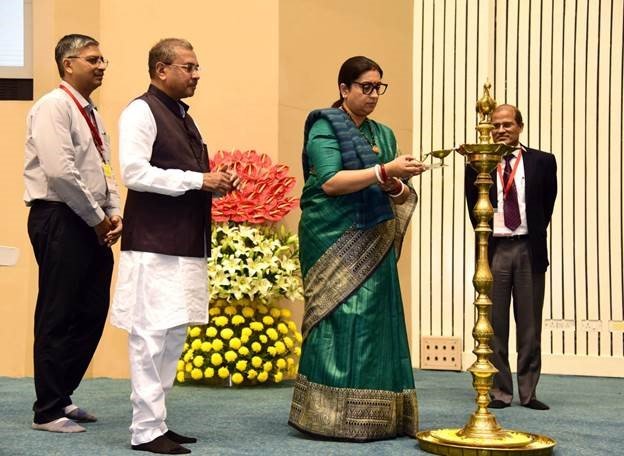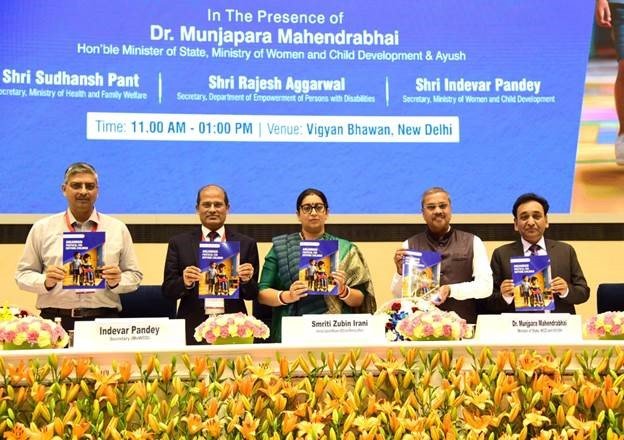The Anganwadi Protocol for Divyang Children was launched on November 28 by the Union Minister for Women and Child Development and Minority Affairs, Smriti Zubin Irani, in the presence of Dr. Munjpara Mahendrabhai, MoS MWCD and AYUSH, Shri Indevar Pandey, Secretary, MoWCD, Shri Rajesh Aggarwal, Secretary, DEPwD, and Dr. K K Tripathy, Economic Advisor, MoHFW. The launch was held at a national outreach programme at Vigyan Bhawan. According to a PIB report, the event was organised to realize the commitment for strengthening Divyang children’s overall access to improved well-being.
The event was attended by senior officers from MoWCD, MoHFW, DEPwD, State WCD Officers, CDPOs, Lady Supervisors, Anganwadi Workers and ASHA workers from across the country and experts from key organizations such as NIMHANS.
In her keynote address, Union Minister Smriti Zubin Irani thanked the DEPwD and MoHFW for aligning support to MWCD’s initiative. The Minister said that currently 4.37 crore children from age 3 to 6 years are being supported with hot-cooked meals and ECCE every day, 4.5 crore children of age group 0 to 3 years with take-home rations and home visits, and more than 8 crore children from 0-6 years age group are supported with growth monitoring and referrals to the health system to enhance early childhood development. The Minister shared that 16 crore home visits have been undertaken for children in the last 4 months by Anganwadi workers.
In a tweet, Union WCD Minister said that aligned with Prime Minister Modi’s vision of a Swasth Suposhit Bharat in Amrit Kaal, this protocol embodies a Social Model for Divyangjan inclusive care under the POSHAN Abhiyan, with a step-by-step approach: Screening for early disability signs, Inclusion in community events and empowering families and Referral support via ASHA/ANM & Rashtriya Bal Swasthya Karyakram (RBSK) teams.
Irani said that through the Divyang protocol, every district administration will be guided in addressing special needs for education and nutrition, providing Swavlamban Cards for the empowerment of divyang children and their families. She also highlighted that the developmental milestones of the children will be tracked on the Poshan tracker and the data will further support convergence between relevant Ministries viz; MoHFW, DoSEL, DePwD, etc. She also proposed an amalgamation between Kiran and Samvaad helplines to come together with the best of their abilities and leverage strengths together.
The Minister underlined the need for improvement and upgradation of Anganwadi Centres to make them more inclusive. She also mentioned that Rs. 300 crore is being allocated for training, and capacity building of Anganwadi Workers and reiterated that the guidance and support of DEPwD’s in AWWs specialized training for identification, referral and inclusion of Divyang Children will be invaluable.

Speaking of the role of communities, the Union WCD Minister highlighted that this is a silent revolution where AWWs will lead awareness and sensitization at the grassroots to shift mindsets. She also added that the process of educating a divyang child has been expensive and unaffordable for many, but now divyang child-care is being made affordable through the Anganwadi network. The Minister urged to create an outreach for parents of children with special needs and build their awareness that these interventions are a medium to enrich their children’s talent and courage and make learning more inclusive. The Union WCD Minister concluded by saying “Let us not allow our minds to limit what a child’s able heart is capable of.”
Download Nagaland Tribune app on Google Play

Dr. Munjpara Mahendrabhai, Minister of State MWCD and Ayush, also addressed the gathering and said that the goal to make every child an equal part of the country’s growth and future and recognised Anganwadi workers as the key to this endeavour. He said that the Anganwadi Protocol is a significant step towards creating a nurturing environment for the support and growth of Divyang children with the key message of inclusion and celebrating differences. He ended his address by reiterating his confidence and trust in the Anganwadi workers and their ability to emerge as a shining example of community outreach for inclusive early childhood care, education and nutrition for India and the world.
Indevar Pandey, Secretary MoWCD, in his welcome address spoke about the implications of the Anganwadi Protocol for Divyang Children. He said that the creation of this protocol is a result of the government’s recognition that undetected disabilities in early years can cause delays in rehabilitation, and can hamper the development of a child. Studies show 30 percent of disabilities in India are preventable if caught early, and with the correct stimulation and simple play-based educational activities conducted for children under the age of 6 years, developmental delays can be prevented from developing into more severe disabilities. Pandey added that ASHA workers will aid the Angawadi workers in their home visits to the families of the children, and help in referring children to health services wherever necessary. In his concluding remarks, he urged all community members to embrace their roles as pillars of strength for Divyang children with utmost sincerity, and to ensure they are reminded of their unique capabilities and motivate them to achieve their dreams.
Rajesh Aggarwal, Secretary (DEPwD) welcomed the launch of the Anganwadi Protocol as a very important milestone in inclusion. He said that according to Census 2011, 2.2% people are disabled in India, which is about 3 crore adjusted to the current population. This makes early intervention and identification crucial, emphasized Aggarwal, who further said that DePwD has released 1 crore UDID card or Unique Disability Identity cards and the age, gender, district segregated data is uploaded online. Stating that the early years, first three years, are critical for fine motor control, cognitive, and mental development and if parents are unaware or misguided, this window of opportunity is gone, Aggarwal underscored the crucial role of Anganwadi Workers.
Dr. K K Tripathy, Economic Advisor, MoHFW expressed his gratitude and hope that the launch of this Protocol will provide the golden opportunity for inclusion and convergence under the guidance of PM’s Health for ALL vision . He said that early intervention is a key solution that can prevent disabilities from worsening. Screening, referral, inclusion and convergence of the Ministry of Health and Family Welfare and Ministry of Women and Child Development is critical in this area.
The event also hosted a panel discussion titled, “Strategies for Early Identification, Screening and Inclusion at the Anganwadi Centre” that spotlighted best practices. The panel experts for the event were: Dr. Geeta Chopra, Professor and Specialist in children with disabilities, University of Delhi, Mr. Nipun Malhotra, Founder, Nipman Foundation, Wheels for Life, and Dr. Shekhar Seshadri, Former Senior Professor, Currently Advisor SAMVAD (MWCD-NIMHANS), Dept. of Child and Adolescent Psychiatry, NIMHANS, Bengaluru. Dr. Shekhar Seshadri moderated the panel. The panel focused on both, the risks inherent to the disability, and the systemic challenges it brings along.
The national event concluded with the experiences sharing about working with specially-abled children by Anganwadi workers (from Solapur, Maharashtra; Gurgaon, Haryana and Noida Uttar Pradesh) to inspire everyone to fulfill their collective responsibility of ensuring that no Divyang child Is left behind.

